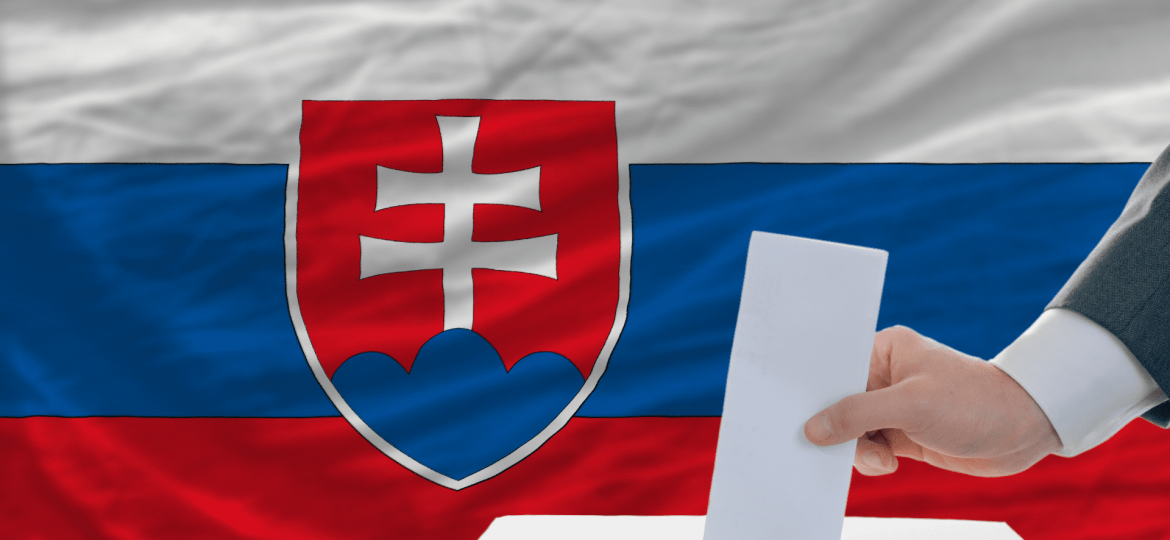
The spread of disinformation on the Internet is perceived as a severe problem by 77% of the Slovak population, which is the highest so far of all previous waves of the longitudinal CEDMO Trends survey, which is conducted for us on a monthly basis by the research agency IPSOS since August 2023. The number of people who perceive disinformation as a threat to the security of Slovakia is also increasing (76%). 39% of the population feels exposed to disinformation. What narratives were most widely spread in Slovakia in February, the month preceding the presidential elections? How many people trust them? And what are the population’s expectations regarding the election of the new head of state? – These questions are answered by the findings of the newly published thematic report on the presidential elections in Slovakia. In addition to the data from the aforementioned survey, it also contains facts recorded by CEDMO’s fact-checkers.
Already in December 2023, the topic of the upcoming presidential elections came to the fore in the Slovak online space. The topic of the war in Ukraine, which has long been leading in terms of frequency of occurrence among disinformation narratives, was particularly relevant in connection with the election campaign and the new government of Robert Fico. More than a third of people in Slovakia, for example, believe that the war is taking place only in the east of Ukraine and not in Kyiv (36%). Almost three-fifths of the population (58%) came across this false information during February. The same proportion of respondents (36%) also believe the disinformation narrative that presidential candidate Ivan Korčok is a diplomat with a US passport and that he denounced his classmates as an StB collaborator before revolutionary year 1989. Both the Nation’s Memory Institute and the Security Services Archive have refuted the authenticity of the documents, as reported by AFP and Demagog.sk.
Presidential elections
More than a quarter of people think that with a new president, the amount of disinformation being spread will decrease. More than two-fifths of Slovaks perceive attempts to influence elections by foreign states as a big problem, but one-third do not consider them problematic. Similar to the situation before the parliamentary elections in autumn 2023, two-fifths of the Slovak population believe that the upcoming presidential elections are likely to be influenced by the European Union (42%) or the USA (42%). The influence of the Czech Republic (17%) and China (14%) are the least likely, while 32% of respondents expect Russia and NATO to be influential. Hungary’s influence is likely for 21% of the respondents.
A third of the people expressed their belief that the security of the country’s citizens will be improved after the presidential elections. Respondents identified the most important factors for choosing a president as the candidate’s honesty and morality, specific proposed solutions from their electoral program, or efforts to change policies.
According to the Slovak population, President Zuzana Čaputová is significantly more impartial in the current election campaign than during the autumn campaign for the parliamentary elections. Compared to the October 2023 measurement, 15% more Slovaks think this. At the same time, 14% fewer people declared that Čaputová supports candidates that are close to her; which was mentioned by more than a third of respondents.
The majority of the Slovak population does not think the results of the presidential elections will change anything. More than a third of people believe that the elections will improve the country’s economy, and a fifth expect an increase in income. According to one-third of the respondents, the results of the elections will lead to a reduction in corruption in the country. Furthermore, 43% of respondents think that democracy will be strengthened. On the contrary, on the issue of support for Ukraine, the population is divided – 22% believe that support will continue, while 27% think that support will stop. The remaining 51% believe that the results of the presidential election (or the personality of the new president) will have no impact on support for Ukraine.
The main disinformation narratives
Anti-government protests have been taking place in Slovak cities since November 2023. A fake video of people chanting pro-Russian slogans in front of the US embassy in Bratislava is circulating on social media. According to the description, the footage was supposed to be taken in February 2024, and the media did not report on the situation. However, it was a video from March 2023, when several demonstrations for peace in Ukraine and in support of negotiations with Russia were taking place in Bratislava. Pro-Russian slogans were raised at these protests, and the Slovak media reported on them then.
In the context of the war in Ukraine, alleged documents have also been circulating in the public information space, according to which Ukraine has agreed with Alexander Soros, George Soros’ son, on transferring 400 hectares of land. The Russian media and the Hungarian pro-government news agency also circulated these allegations. There has also been disinformation about Volodymyr Zelensky’s alleged assets in the West – this time, the Ukrainian President was supposed to have bought a villa in Berlin, where the Nazi propaganda minister Joseph Goebbels once lived.
Slovak politicians have also been affected by the spread of fake documents. AFP pointed out that former Prime Minister Igor Matovic’s alleged driver’s license with the inscription “drive only under supervision” was, in fact, created as a satire. However, it was clear from the number of shares and comments on social media that people believed it was an authentic document. Similarly, the fake US passport of presidential candidate Ivan Korčok, which was created with the help of artificial intelligence, went viral. During February, as in previous months, Slovaks were confronted with disinformation related to the war in Ukraine and statements by various political figures. Currently, the topic of so-called deepfakes is very relevant. In this context, Slovak Prime Minister Robert Fico was exploited in a video created by artificial intelligence. In this video, he lures people to the fictitious investment platform of the SPP company and promises a high passive return on the investment. The fake deepfake video was based on Fico’s New Year’s speech footage. The website mentioned in the video is fraudulent and tries to obtain personal data from users. SPP has distanced itself from the video. Over a fifth of Slovaks (22%) have seen this deepfake video with Robert Fico. The vast majority of the population considers the video fake or inauthentic, with only 7% expressing the opposite opinion.
Knowledge of deepfake
Almost half of Slovaks do not know what a deepfake is. Just under two-fifths correctly stated that it is a seemingly real, artificially created picture, video or sound of something not based on truth. Four in ten respondents declared that they had encountered deepfake content in recent months.
The vast majority of respondents agree that social media operators should remove deepfake content. They also agree that deepfakes will fundamentally increase the occurrence of disinformation. More than three-quarters believe that people will stop trusting real videos. Two-thirds believe that deepfake videos will be used by political parties to smear their political rivals.
Chain emails
Over the survey period (from August 2023), there is a downward trend in the frequency of chain emails. While 55% of the population received chain emails at least once a week in August 2023, by February 2024, the share of this group of people had decreased significantly to 38%. Almost two-thirds (62%) of those surveyed declared that they had not received such a message in the last month.
CEDMO Trends SK is a unique longitudinal panel research conducted over a period of thirty months. It offers an exceptional insight into the evolution of the population’s behavior in consuming different types of media content, focusing on specific types of information disturbances such as disinformation and misinformation. These not only undermine public trust in the institutions necessary for a pluralist democracy to function but can also amplify individual infodemias. It is being carried out for CEDMO (Central European Digital Media Observatory) by the research agency IPSOS on a representative sample of more than 1 900 respondents aged 16 and over.
